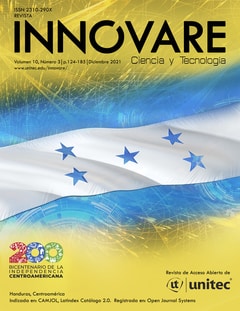Frequency of adverse events due to anticovid vaccines in the department of Atlántida, Honduras
DOI:
https://doi.org/10.5377/innovare.v10i3.12987Keywords:
COVID-19, Side effects, VaccinationAbstract
Introduction. COVID-19 represents the defining global health crisis of our time. On March 11, 2020, the first two cases were confirmed in Honduran territory, after the World Health Organization declared COVID-19 a pandemic. This study explored the frequency of adverse events of anticovid vaccines in individuals from the department of Atlántida, Honduras. Methods. The study was cross-sectional, including people over 18 years of age, at least 24 hours after vaccination. To collect information, an online survey previously validated by the COVID-19 Observatory of UNITEC and the COVID-19 Honduras Research Consortium, sharing it by the WhatsApp messaging application, through the snowball dynamic effect. Results. Two hundred and twelve individuals participated during the first six months of 2021. The AstraZeneca/Oxford vaccine was the most frequent between responders (88%); 72% of those vaccinated with AstraZeneca presented 1 to 4 symptoms as adverse events, and the remaining 28% had more than 4 symptoms. Most adverse events occurred the following day after the jab, the most frequent were pain in the injected arm, fever, and generalized muscle pain; 42% of participants required analgesics or anti-inflammatories to treat post-vaccination symptoms, and 8% stated that they had taken some medication prior to vaccination to reduce the possibility of adverse events. Conclusion. The most widely available vaccine during the study was AstraZeneca, associated with transient adverse events to a lesser degree than the other vaccines.
Downloads
1705
Published
How to Cite
Issue
Section
License
Copyright (c) 2021 Leslie M. Sabillón, Olga F. Reyes, Carlos A. Cabrera

This work is licensed under a Creative Commons Attribution-NonCommercial-NoDerivatives 4.0 International License.




